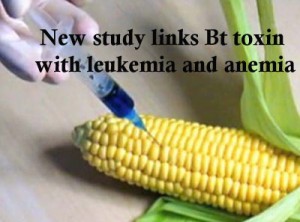Scientists Discover Correlation Between GMOs and Leukemia

5th August 2013
By Carolanne Wright
Contributing Writer for Wake Up World
As if there isn’t enough reason to avoid genetically modified food, new research has discovered GMOs are linked with leukemia and anemia. The study found that Bacillus thuringiensis (Bt) used in bioengineered seeds has a substantial adverse effect on blood cells and bone marrow cell proliferation. Even at the lowest dose, the effects were deemed virulent to proper cell health.
Birth of Bt Frankenfood
Bacillus thuringiensis is naturally found in the soil and has been used as a foliar insecticide since the late 1960s. Farmers spray their crops with the bacteria, insects consume it and their stomachs subsequently break open. However, use of the toxin didn’t stop as a topical pesticide. As reported in the Natural News article, “Rid the body of dangerous Bt-toxin found in genetically modified food with these tips:
“Monsanto decided it would be profitable to splice a gene of Bt with corn, soybeans and cotton – creating plants that were rife with the bacteria not just on the surface but within the cell wall. Monsanto and the Environmental Protection Agency claimed the toxin would be destroyed within the digestive tract of mammals and magically disappear. Guess what? The physicians at Sherbrooke University Hospital in Quebec, Canada discovered Bt-toxin in 93 percent of 30 pregnant women, 80 percent of umbilical cord blood of their babies and 67 percent of 39 women who were not pregnant. Considering Bt-toxin is linked with cancer, autism, severe food allergies and autoimmune disease, these findings are downright frightening.”
And now it looks as though two more ailments will join the ranks: leukemia and anemia.
Connection between GM food and blood cell cancer
Published in the peer-reviewed Journal of Hematology & Thromboembolic Diseases, researchers at the Institute of Biological Sciences in Brazil found that Bt is adept at damaging red blood cells along with white blood cell reproduction in mammals. The scientists fed mice varying amounts of the toxin and noted that even after just a single dose, it caused several blood irregularities – anemia and damage to bone marrow cells. According to Sayer Ji of GreenMed Info:
What the new study revealed is that various binary combinations and doses of Bt toxins are capable of targeting mammalian cells, particularly the erythroid (red blood cell) lineage, resulting in red blood cell changes indicative of significant damage, such as anemia. In addition, the study found that Bt toxins suppressed bone marrow proliferation creating abnormal lymphocyte patterns consistent with some types of leukemia.
The research team concludes:
Taking into account the increased risk of human and animal exposures to significant levels of these toxins, especially through diet, our results suggest that further studies are required to clarify the mechanism involved in the hematotoxicity found in mice, and to establish the toxicological risks to non-target organisms, especially mammals, before concluding that these microbiological control agents are safe for mammals.

No comments:
Post a Comment